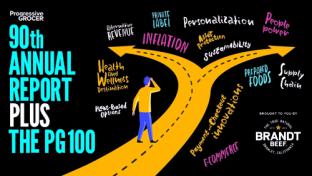Stress, Inflation Impacting Healthy Food Choices: IFIC

The International Food Information Council (IFIC) is out with its 18th annual Food and Health Survey, which again reflects the times. According to this year’s survey of more than 1,000 Americans, price and stress are driving food choices and eating habits.
Although basic appetite appeal is still a dominant factor – 87% of consumers agree that taste is a purchase motivator – a confluence of external circumstances is influencing decisions, similar to the way that pandemic did a few years ago. Inflation is chief among those circumstances.
[Read more: “For Consumers, Value Means More Than Price”]
In 2023, 76% of consumers reported that price currently influences their selection of healthy foods, while three in 10 consumers who noticed high food prices reported that they made less healthy choices as a result. On that note, 91% of respondents said they saw a jump in food costs, up from 83% in 2022.
Stemming from high food prices and a host of other concerns, IFIC’s survey showed that everyday stress is affecting healthy eating habits, for better or worse. Nearly two-thirds (60%) of those surveyed report that they are somewhat or very stressed. Stress cuts two ways, too: 74% said that what they eat or drink has a moderate or significant impact on their overall well-being, while 61% said their overall well-being has a moderate or significant impact on their food choices. As with price, stress is a swaying buying considerations, as a slight majority (51%) of those polled said they consumed less healthy food and beverages over the past six months compared to their typical habits.
This year’s IFIC Food & Health survey uncovered other trends that can reverberate at the retail point of sale:
- Social media offers opportunities to promote healthier food choices and, at the same time, causes confusion. A majority of 60% of those who have seen social media content related to food said that it encouraged them to make at least somewhat healthier choices. That said, 68% see a lot of conflicting information on social media and 60% report that such disparities make them doubt their food choices.
- Labels remain an important message point in the physical store, as 55% of consumers who shop in-person are likely to check food labels, compared to 46% of those who buy online. If the word "healthy" is on the label, shoppers will overwhelmingly choose that option, the survey also affirmed.
- Just about half (52%) of consumers said they follow a specific diet or eating plan. High protein diets were the most popular followed by “mindful” eating.
- Sustainability ebbed a bit this year as a factor in food and beverage purchases, down from 39% to 34% and behind four other main motivators. Millennials and Gen Z consumers were more likely to say that climate-friendly attributes like recyclable packaging, reusable packaging and locally grown products affected at least some of their choices.
A key takeaway from this year’s findings is that the new normal seems to be reaction to change. “The 2023 IFIC Food and Health Survey is a comprehensive snapshot of the complex factors that shape American food and nutrition choices,” said Wendy Reinhardt Kapsak, MS, RDN, president and CEO of IFIC. “As we navigate the shifting landscape of food production and consumption, this survey underscores the importance of balancing competing priorities, and consumers’ desire for clear and accurate information that empowers them to make the best food and beverage decisions for themselves and their families.”







